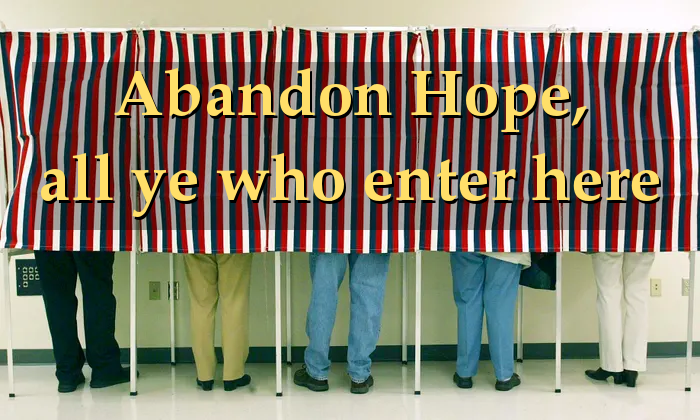I’ve developed the bad habit lately of annoying my friends. When one of them posts a get-out-the-vote election-boosting thing on the Facebook or somewhere, I’ll sometimes take a brief potshot at their sacred cow, and include a link to my anti-voting manifesto.
The disadvantage of being on the don’t-vote side of the argument is that you’re mostly alone against the orthodoxy and people start off dead-set against agreeing with you whatever your arguments are. The advantage is that your arguments are better — first because you’re right, which makes forming correct arguments easier; and second, because thanks to the intransigence of your audience you have to try that much harder.
There are some good pro-voting arguments that are nuanced and difficult to refute (though this is not necessarily enough to make them convincing), but by and large when I see people promoting voting or trying to shoot down anti-voting arguments, their reasoning is mostly lazy smoke-blowing and glittering generalities instead. This seems to be because when you already have most people on your side you don’t feel like you have to try very hard.
But recently a couple of my friends took the bait and tried to argue me out of my position. The two main forks of my argument can be summarized as: 1) voting isn’t helpful, and you do nothing to make anything better by voting; 2) participating in the election spectacle is harmful and diverts your focus from things that would be helpful. Wisely, I think, my friends focused on prong #2, which, I have to admit, I ask you to believe mostly on the strength of rhetoric and plausibility rather than math and logic, as it’s not quite as cut-and-dried that way.
They believed I was unfairly discounting some plusses of participating in the election process that don’t depend on it being directly helpful or effective. For example:
- People who participate in elections thereby educate themselves somewhat about the structure of the government and the various issues under debate, and this might be helpful in making them more effective at making change.
- In the course of debate about the election they may be inspired to take action on various issues they hear about in a more direct, non-electorally vicarious way.
- Participating in the election gives people hope that they have the power to make change — it’s a beneficial way to encourage people to envision a different, better polity. In the absence of this hope, people may become discouraged and give up. When I tell people “voting won’t help” they may hear “nothing you do will help” and so they may retreat into passive helplessness.
For points #1 & #2, I’m willing to concede and throw those possible positives into my calculation of the benefits and harms of voting, though I don’t think it changes the end result much. Getting people excited about voting so that they can then become educated about the structure of government and learn about ways they might take direct action is an awfully Rube Goldbergy way to go about it. Perhaps it is effective to some extent, but it’s awfully inefficient. And voting doesn’t seem necessary to this process, merely arguably sufficient. In the absence of voting, would nothing more efficient and less harmful fill that void? I suppose that could be argued, but I’d need convincing.
Point #3 however I think is entirely backwards. I want to put in a good word for hopelessness. I want to encourage people to abandon hope in the electoral process and do something useful instead, in the same way that I want to encourage someone with a malignant tumor to stop watching faith healers on TV and make an appointment with an oncologist. The time has come, say I, for you to get seriously hopeless. Not because there is no hope, but because your hope lies elsewhere.
There’s a common alcoholic metaphor I’ve heard, about looking for the solution to your problems at the bottom of the bottle. After a while, the alcoholic’s problems largely are subsumed into their drinking problem, but they keep returning to drinking as a way of trying to solve it. Even when they eventually decide to quit, they search for some way they can drink their way out of their drinking — by drinking strategically, only at certain times or in certain amounts or of certain varieties of booze. At some point, if they really want to solve their problem, they have to give up that hope. They have to lose hope so they can find it again. They have to loosen their grip on the bottle so their hands are free to grasp a different hope that might actually deliver.
I think it’s the same story with voting. The more you imagine voting your way into a better world, the less likely you are to actually live in that world. In order to change things for the better, you really have to give up on that bad habit for good, and address your problems directly. You have to put down the pencil, turn your back on the voting booth, walk out determined never to return, and put your hope somewhere else instead.

